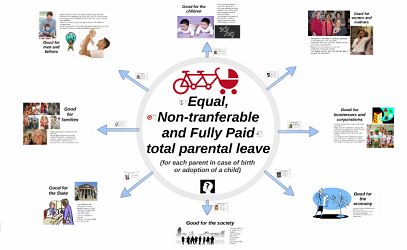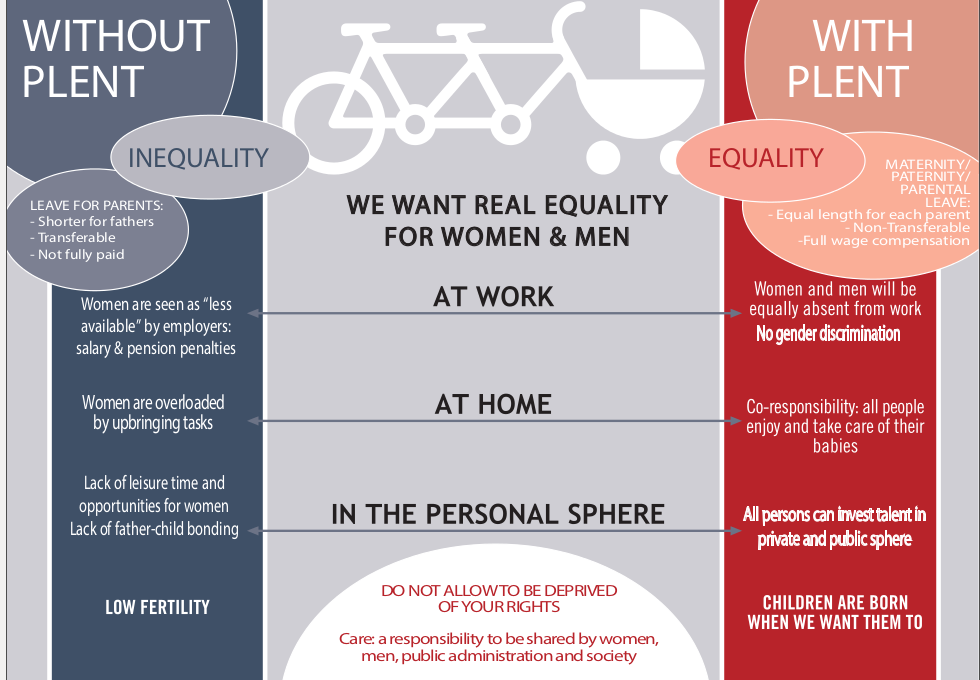The European Commission, the Council and the European Parliament are discussing about the implementation of a directive that improves safety and health at work of pregnant workers, workers who have recently given birth or are breastfeeding. Improvement, according to this proposal, would be to grant women 20 continuous weeks of maternity leave, allocated before and/or after confinement. Other measures are included, such as protection from hard work, night shifts, the right to time off for breastfeeding, etc. The European Parliament proposed in October 2010 this draft for amending the old Council Directive on maternity leave from 1992.
Last May, 19th, 2015 the European Parliament (EP) debated again on this pending directive, and many members of the Parliament (MEP) said that the implementation of this directive would improve work-family conciliation, diminish the mother’s discrimination in the labour market and improve gender equality. Few, like one Swedish MEP from the European Popular Party, criticized the proposal just for not having an equality perspective. Anna Maria Corazza Bildt stated: “the time has come to talk about shared parental leave, not maternity leave. To support working mothers we have to involve fathers in taking responsibility for their babies, not oblige women to stay at home. That is why I welcome the Commission’s intention to withdraw the proposed Maternity Leave Directive. The way to equality would not be to have only mothers at home. The directive would be a setback, not a way forward for mothers. Women should have the same rights and opportunities as men to achieve work—life balance. To improve equality for women we need to stop considering women as the sole parent responsible for children and encourage both parents to take care of their kids”. In effect, if one reads the proposed article 8 of the EP maternity leave proposal, following is stated:
Article 8a
Paternity leave
1. Member States shall take the necessary measures to ensure that workers whose life partner has recently given birth are entitled to a continuous period of non-transferable paid paternity leave of at least two weeks, granted on an equivalent basis – except with regard to its duration – to maternity leave, to be taken after the confinement of the worker’s spouse or partner during the period of the maternity leave.
[…] in order to promote equal participation of both parents in balancing family rights and responsibilities.
The Platform for equal, non-transferable and well-paid parental leave (PLENT) agrees with most MEP on the idea that social rights for women are important, that balancing work and family responsibilities is still a challenge, and that mothers should not be discriminated against nor suffer from a motherhood penalty in form of lower salaries and pensions. Yet, how can this be achieved by a directive that proposes to increase maternity leave to 20 weeks, while limiting paternity leave to 2 weeks? In addition, fathers are supposed to take these two weeks during the period of maternity leave. Are they not able to caring alone, for instance, after the mother completed her maternity leave?
If men are not seen as equally able and committed to care as women, employers will penalize women compared to men, including women without children and without plans to have a child. Several studies show that family-friendly policies can backfire, if they are not well designed. For instance, if leaves that are taken up by women are too long, they may lose track of their employment careers. In addition, policies have to be gender neutral. In the case of leaves, it means equal in duration, pay and take-up probability by women and men. In this line goes the statement of Věra Jourová, a member of the European Commission, in the above-mentioned debate: “I am therefore open to start looking into a new approach to tackle the challenges faced by them. We know that it is mainly women who are hit by what the economists call ‘the motherhood penalty’. They see their potential, and even their ability to participate in the labour market, fall when they become parents. The gender pay gap, which is almost non-existent before child-bearing age, remains, still, at 16% and the gender pension gap stands at 39%. […] Women and men have to be able to balance working life so that they can have the family they want. They need to have a choice. Men should also be encouraged to live up to their family responsibilities. Many men would like to spend more time with their children but face difficult circumstances in the workplace. Creating conditions that allow a proper work-life balance will help families, businesses and our societies as a whole and will promote more gender equality at all levels”.
PLENT wants to raise its voice as a stakeholder on this issue asking for the implementation of equal, non-transferable and well-paid parental leaves for both women and men. This is the only measure that will enable women and men to learn caring for their children from the very beginning, to take turns in caregiving and to be seen as equal responsible humans that balance work and family responsibilities. Equality of rights to caregiving is the most appealing measure to reduce the motherhood penalty. Further EU legislation should be developed this way.






